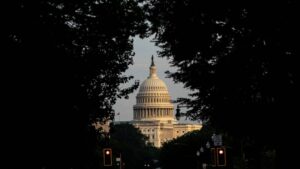In a striking twist of political drama, the so-called truce between billionaire tech magnate Elon Musk and former President Donald Trump has unraveled in a matter of weeks. After a brief period of reprieve from their contentious past relationship, Musk has re-emerged in the political spotlight with stark opposition to Trump’s recently advanced domestic policy bill, dubbed the “Big, Beautiful Bill.” Following the Senate’s narrow procedural vote to proceed with debates on the legislation, Musk announced his plans to leverage his substantial financial influence to orchestrate primary challenges against Republican lawmakers in Congress who supported the bill. His campaign is driven by a passionate critique of the bill’s significant financial implications, which he deems excessive and irresponsible.
The tension escalated significantly when Trump retaliated late Monday evening, indicating that his administration might look into the extensive government contracts awarded to Musk’s various enterprises. At a White House conference, he insinuated that Musk’s defiance could result in losing much more than just government subsidies, ominously hinting that his past leadership of the Department of Government Efficiency might come back to haunt him.
Although their previous feud had devolved into personal accusations regarding controversial figures and allegations concerning Jeffrey Epstein, the recent squabble has yet to reach that level of animosity. Musk himself expressed remorse just a week after their last altercation and had deleted several provocative posts, opting instead to redirect attention to his business ventures rather than pursue political battles.
However, Musk’s tone changed dramatically as he pivoted back to directly opposing the government’s spending priorities. This time, while echoing his disapproval of the bill, he notably refrained from mentioning Trump directly in his numerous public statements. Nevertheless, the ramifications of this public feud are manifesting in a tangible decline in Tesla’s stock prices, which fell dramatically following his renewed criticisms. Investors are increasingly jittery about the repercussions of a Musk-Trump confrontation on Tesla’s crucial government contracts. Key financial analysts have noted that the ongoing political melodrama poses a continued threat over Tesla’s stock valuation and market perception.
The stakes are elevated for Musk as he escalates his critiques against the bill, arguing that it undermines his commitment to fiscal responsibility. With Congressional Budget Office estimates predicting an addition of nearly $3.3 trillion to the deficit over the coming decade due to the Senate bill, Musk has vehemently condemned your lawmakers voting for such proposals. He posted fiery messages on social media denouncing these members as “liars” and promising to hold them politically accountable in upcoming primaries for their contradictions regarding government spending.
Key to this political engagement is Musk’s proposed formation of a new political party: the “America Party.” He aims this endeavor as a populist alternative to the traditional Republican and Democratic systems, asserting that if the controversial spending bill passes, this new party will be established almost immediately. Moreover, he made proactive political gestures, such as planning to support Kentucky Rep. Thomas Massie, one of the few Republicans who voted against the bill and has previously faced Trump’s ire for his resistance.
Trump’s subsequent responses have included thinly veiled threats regarding Musk’s financial future, including alluding to potentially scrutinizing his government subsidies further with a glance toward federal investigations. His comments imply that if Musk’s political battle continues, his companies might face serious financial setbacks, given their reliance on government contracts and subsidies.
Underlying this tension is a complex relationship between Musk and federal policies affecting his business operations, particularly with Tesla’s operation thresholds reliant on tax incentives and regulatory credits. The withdrawal of these benefits, as suggested by Trump’s administration, could result in significant financial losses for Tesla, complicating Musk’s financial stability and operational future.
Ultimately, the unfolding narrative highlights a broader clash between two titans within their respective fields: Musk, a heralded innovator in technology and transportation, and Trump, a prominent figure in American politics. With Musk’s ability to influence public opinion and potentially alter the political landscape through his financial resources, observers are left wondering how these developments might unfold and what consequences they hold for sectors spanning from technology to traditional political avenues. Amidst a growing tension, the future remains unpredictable as both figures navigate the complexities of their intertwined ambitions and ideologies.









